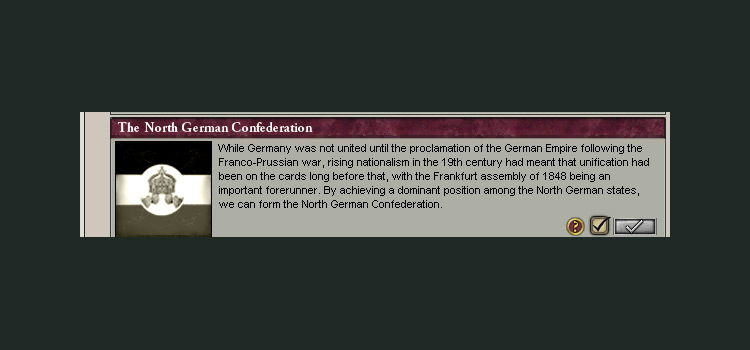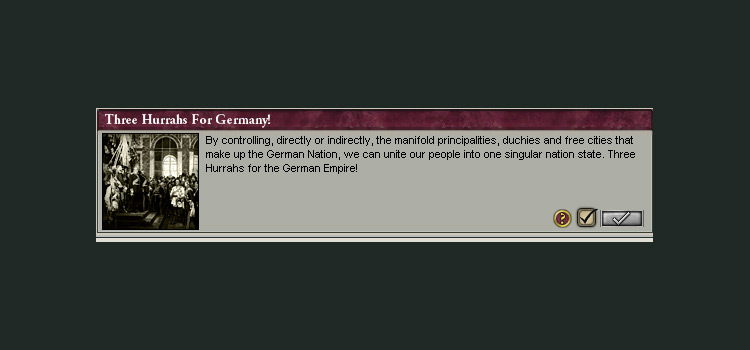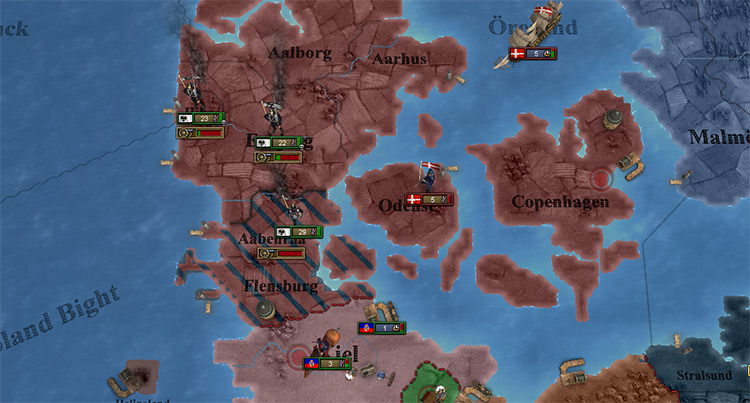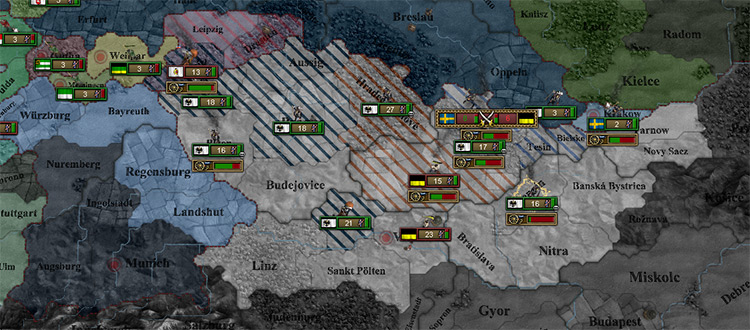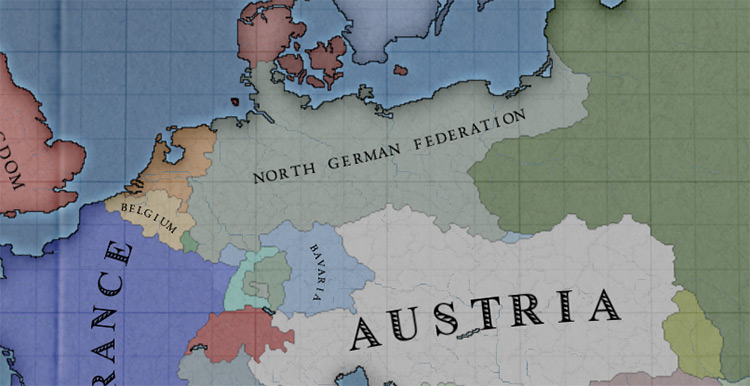Prussia has many unique decisions that lead to the unification of the German Empire. With a large population, the highest literacy among great powers, and plenty of natural resources, Prussia is a great choice to play a Euro-centric game that will see little to no colonial expansion overseas and plenty of annexations on the continent. Prussia is a powerful and beginner-friendly country, even if all its starting resources can be overwhelming for a new player.
Start: A Divided Kingdom
Prussia controls the resource-rich Rhineland and rules over several minor German states. Its sphere of influence contains many tiny nations, which would be much more efficient if annexed directly. Furthermore, Prussia owns no colonial empire to speak of, and its attention will be focused on European affairs, with Austria constantly competing over control of the German region. This means that access to several resources will be limited, at least during the early game, but a very high rank should mitigate this. Prussia’s main asset is its powerful army, a large, modern force that can defeat most enemies with little difficulty. The economy is also growing, with capitalists already set up to build new factories and expand the nation’s production capabilities. Let’s take a look at our main goals during the game.
The North German Federation
The North German Federation can be created by any nation with North German primary culture, but Prussia is by far the most powerful. To create it, we have to control directly or through our sphere of influence all the states that:
Are a core of the German Empire. Have a majority of North German culture.
The territory required at the game start is our own plus Hannover, Schleswig-Holstein, and Saxony. We should be able to get all of these in five years max, unifying the countries in our sphere of influence and establishing a centralized state.
The German Empire
Forming the German Empire is harder. The decision is similar to most other cultural unions, such as Italy and Scandinavia. Here are the requirements:
Be a great power Have 45 prestige Own all the German cores
The first two are trivial, but the German cores include most of Austria’s sphere of influence and France’s Alsace-Lorraine, forcing us to go toe to toe with two great powers. In this guide, we’ll unify the northern German states, and then I’ll give you some tips on beating France to form the German Empire.
An Army With a Country
Your economy is basically on autopilot with the conservative (light blue) party in power, just fund the occasional project and reap the benefits of a mighty, industrialized nation. Start by researching Realism to gain more prestige and use your national foci to encourage clergymen in your two most populous states. This will ensure that you do not fall behind other great powers. You should focus on military expansion, choosing the targets that will bring you closer to the unification of the German states. There are three states that you must bring into the fold before enacting the unification decision:
Hannover is in Great Britain’s sphere of influence in 1836, but you can begin influencing it right from the start because of an initial investment of ten thousand pounds. It will become hostile to Great Britain in 1838, after the coronation of Queen Victoria, and you will be able to sphere it without difficulty. Schleswig-Holstein is held by Denmark and its puppet, Holstein. You should sphere Holstein and declare war on Denmark while it has no allies to acquire the state. Saxony starts as an Austrian satellite. You can either bring it into your sphere of influence through diplomacy, or declare war on Austria to do it forcefully.
These early wars are relatively simple because you have a stronger military than your opponents, but the sooner you win them, the sooner you will be able to move on to the real threat: France.
War with Denmark
This war is extremely simple: just sphere Holstein (it starts neutral with all great powers) before justifying a casus belli against Denmark. Use acquire state to get Danish Schleswig-Holstein and defeat the Danish army with your superior numbers. Denmark will prevent you from getting its capital by blockading the straits, but you don’t actually need it. Just occupy Schleswig and Jylland: at this point, Denmark will accept a peace that costs them only half a state. An important note: you do not need to liberate Holstein, just sphere it and it won’t be able to wage war against you. As you form the Northern German Federation, it will be annexed despite being a Danish puppet.
War with Austria
Claiming Saxony is a tad harder: you will have to wrestle it from another great power, and it is much faster and more convenient to take it with war. To defeat Austria, get as many allies as you can. Negotiate alliances with all your spherelings and try to get Sardinia-Piedmont and Sweden on your side as well. It will be a bloody affair, but your army is more powerful and you have more allies, so you should manage to get the peace deal you want before long.
New Goals and New Enemies
Once Austria and Denmark are defeated, you should be able to form the Northern German Federation between 1839 and 1841, annexing all your spherelings. This should easily keep you in the top three, score-wise. You will need to declare war on Austria a second time, with the Assert Hegemony casus belli, to get its South German puppets (Bavaria, Baden, and Württemberg), but you cannot do this before researching the Nationalism and Imperialism technology that is only available from 1850. You will also have to take, in some way, Alsace-Lorraine from France. This is no easy task: your opponent has a massive population and an army to match, plus the Equality national value that allows it to mobilize a staggering 6% of its population in times of war. The best option is to wait and establish alliances: France has a low birth rate and tends to ally with the Russian Empire, so a rising German power should seek a similarly strong ally such as Great Britain, the Netherlands, or possibly Italy and declare war once the opportunity arises. In the end, a German Empire founded by Prussia should easily be able to become the greatest power at the turn of the century. And from there on the opportunities are limitless.
